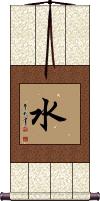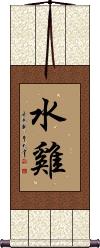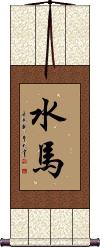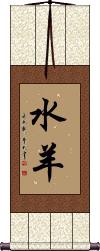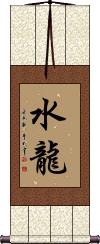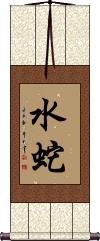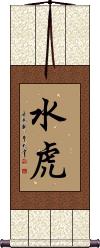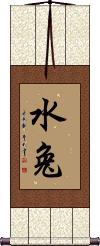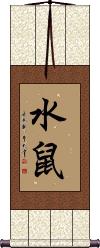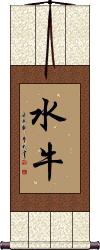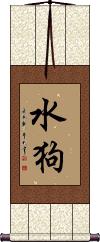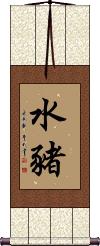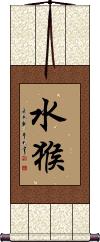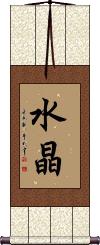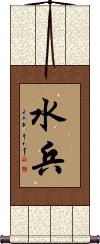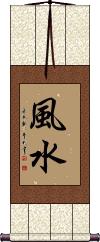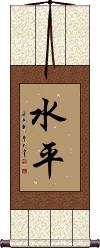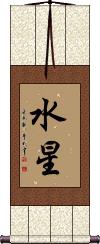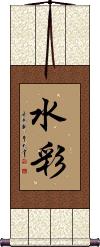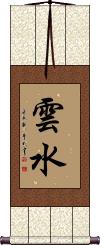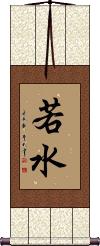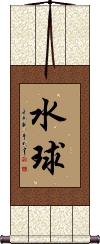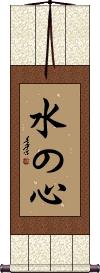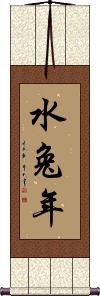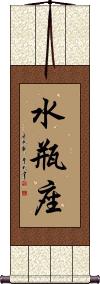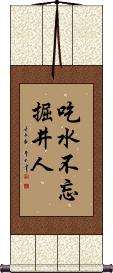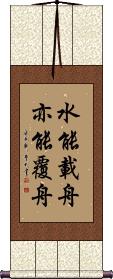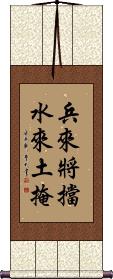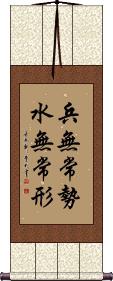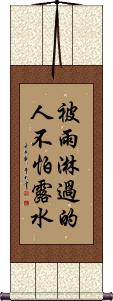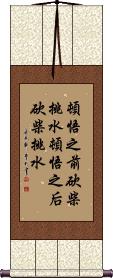Many custom options...
And formats...

水 in Chinese / Japanese...
Buy an 水 calligraphy wall scroll here!
Personalize your custom “水” project by clicking the button next to your favorite “水” title below...
1. Water
3. Water Horse
5. Water Dragon
6. Water Snake
7. Water Tiger
8. Water Rabbit
9. Water Rat
10. Water Ox/Bull
11. Water Dog
12. Water Pig/Boar
13. Water Monkey
14. Crystal
15. Enlisted Sailor
16. Feng Shui
17. Horizontal
18. Mercury
19. Midori
20. Unsui
21. Be Like Water
22. Water Tiger
23. Water Polo
24. Water Rat
25. Mind Like Water
27. Aquarius
28. Be Like Water
29. Dripping Water Penetrates Stone
30. Fire and Water Have No Mercy
31. Flower in the Mirror, Moon on Water
33. Four Elements
34. Put out a burning wood cart with a cup of water
35. Ultimate Goodness of Water
37. A rising tide lifts all boats
38. Five Elements
39. Drinking the water of a well: One should never forget who dug it
40. Not Only Can Water Float A Boat, It Can Sink It Also
41. Soldiers Adapt Actions to the Situation
42. Warriors Adapt and Overcome
Water
(One of the five elements)
水 is the symbol for water in Chinese, Japanese Kanji, and old Korean Hanja.
Water is one of the five elements that ancient Chinese believed all things were composed of. These elements are also part of the cycle of Chinese astrology. Every person has both an animal sign, and one of the five elements according to the date of their birth. See also Five Elements and Chinese 12 Animals / Zodiac.
Water Rooster
The Year of the Water Rooster
Water Horse
The Year of the Water Horse
Water Goat/Sheep
The Year of the Water Goat/Sheep
Water Dragon
The Year of the Water Dragon
Water Snake
The Year of the Water Snake
Water Tiger
The Year of the Water Tiger
Water Rabbit
The Year of the Water Rabbit
Water Rat
The Year of the Water Rat
Water Ox/Bull
The Year of the Water Ox/Bull
Water Dog
The Year of the Water Dog
Water Pig/Boar
The Year of the Water Pig/Boar
Water Monkey
The Year of the Water Monkey
Crystal
This word means “crystal” such as fine crystal glassware or diamonds in Chinese, Japanese, and Korean Hanja.
水晶 is a cool selection if your name is Crystal, as it will match your name by meaning (rather than pronunciation).
It's also cool because it will universally contain the meaning of your name in most Asian languages.
Enlisted Sailor
水兵 are the Chinese and Japanese characters for “Sailor.”
Specifically, this refers to an enlisted sailor.
These two characters literally mean “water soldier.”
Feng Shui
風水 is the famous technique and approach to arranging your home externally around natural features and internally to create balance and peace.
These two characters literally mean “wind water.” Obviously, the title is far more simple than the concept behind this subject.
It may enlighten you slightly to know that the character for “wind” can also mean style, custom, or manner in some contexts. This may apply somewhat to this title.
In a technical sense, this title is translated as Chinese geomancy.
Horizontal
水平 means level, standard, horizontal, or horizontality.
水平 is also a surname in Japanese which romanizes as Midzuhira or Mizuhira.
Mercury
水星 is the title for the planet Mercury in Chinese, Japanese Kanji, and old Korean Hanja.
The literal meaning is “water star.” This title has been used to refer to Mercury in much of Asia for the past 2200 years or longer.
Midori
This can be a Japanese female given name that romanizes as Midori. Note: There are other Kanji combinations that romanize as Midori, this is not the only Midori out there.
Otherwise, and in other Asian languages, this means watercolor.
Unsui
Be Like Water
Quote from Lao Tzu
若水 is part of a very old saying from Lao Tzu.
In these two characters, there is a suggestion to be like water. The full phrase is about the goodness and purity of water. So, when this suggests being like water, it is actually a suggestion to be a good person (one who does not dishonor himself/herself, etc.).
Water Tiger
Water Polo
水球 is the Chinese, Japanese Kanji, and old Korean Hanja title for water polo.
The literal meaning of the characters is “water ball.”
Water Rat
Mind Like Water
Mizu No Kokoro
水の心 is the Japanese Buddhist and martial arts phrase, “Mizu no Kokoro,” which means “mind like water” or “heart of water.”
The phrase is a metaphor describing the pond that clearly reflects its surroundings when calm but whose images are obscured once a pebble is dropped into its waters.
Year of the Water Rabbit
1903 1963 2023
Aquarius Zodiac Symbol / Sign
水瓶座 is the Chinese and Japanese way to write Aquarius (water bearer) of western astrology.
Be Like Water
像水一樣 is a short quote from a much longer statement by Bruce Lee.
He summarized how people should be flexible to all circumstances, attacks, or situations. In the end, he exclaims, “Be like water, my friend.” 像水一樣 is the “Be like water” part alone since that seems to be what most people want.
Dripping Water Penetrates Stone
滴水穿石 is a Chinese proverb that means, dripping water penetrates stone.
The figurative meaning can be translated as:
Constant perseverance yields success.
You can achieve your aim if you try hard without giving up.
Persistent effort overcomes any difficulty.
While 滴水穿石 is the most common character order, you will likely see 水滴石穿, might see 滴水石穿, and will rarely see 小水穿石 in the wild.
Fire and Water Have No Mercy
Flower in the Mirror, Moon on Water
鏡花水月 is an old Asian proverb that means “flowers in a mirror and the moon reflected in the lake” or “flowers reflected on a mirror and the moon reflected on the water's surface.”
Literally, 鏡花水月 reads “Mirror Flower, Water Moon.”
Figuratively this can be used to represent a lot of different ideas. It can be used to express an unrealistic rosy view or viewing things through rose-tinted spectacles. So you can use it to relay an idea about something that is visible but has no substance,
something that can be seen but not touched, or something beautiful but unattainable such as dreams or a mirage.
This expression is used to describe things like the subtle and profound beauty of poems that cannot be described in words.
鏡 = Mirror (or lens)
花 = Flower(s)
水 = Water
月 = Moon
Can also be written 水月鏡花 (just a slight change in word/character order).
Forgive and Forget
Water Under the Bridge
水に流す is a Japanese proverb that suggests that “water continues to flow.”
It's similar to our English phrase, “Water under the bridge.” The perceived meaning is, “Forgive and forget.”
I have also seen this translated as “Don't cry over spilled milk.”
Note: Because this selection contains some special Japanese Hiragana characters, it should be written by a Japanese calligrapher.
Four Elements
Buddhist Term
地水火風 is a Buddhist term that means “earth, water, fire, wind.”
This is often just referred to as “the four elements.” There is a more common title (the five elements) that adds wood to the mix. These four elements are used in some sects of Japanese Buddhism (not so much in Chinese).
Put out a burning wood cart with a cup of water
An utterly inadequate measure
杯水車薪 is a warning against a futile effort.
This proverb literally refers to one who is “trying to put out a burning cart of wood with a cup of water,” or “throw a cup of water on a cartload of wood.” The lesson to be learned is about using the right measure or tool for the job and not wasting your effort if you are inadequately equipped for the task at hand - in other words the postscript should be “go get a bucket or a fire hose.”
Ultimate Goodness of Water
Quote from Lao Tzu
High Mountain Long River
山高水長 is a Chinese idiom that means “high as the mountain and long as the river.”
It figuratively means “noble and far-reaching.”
Not sure this is valid or commonly used in Korean. It probably was borrowed into Korean a few hundred years ago but is obscure now.
A rising tide lifts all boats
Five Elements
金木水火土 is a list of the Chinese characters for the five elements in a comfortable order (meaning that they “feel right” to a Chinese person who views this arrangement).
The order is metal, wood, water, fire, and earth.
Note that sometimes the metal element is translated as gold. And earth refers to soil versus the whole planet earth.
Five Elements
地水火風空 is the specifically-Japanese version of the five elements.
This is a little different than the ancient or original Chinese version.
The elements are written in this order:
1. Earth / Terra / Ground
2. Water
3. Fire
4. Wind / Air
5. Sky / Emptiness / Void / Ether
Note: This set of Kanji can also be romanized as “ji sui ka fuu kuu,” “jisuikafuukuu,” or “jisuikafuku.”
These can also be written in the order 地火風水空 (chi ka sui fuu kuu). Let me know when you place your order if you want the Kanji to be in this character order.
Drinking the water of a well: One should never forget who dug it
This proverb suggests that one should always be grateful to those who helped one succeed.
And remember your ancestors and those that came before you whose sacrifices made your present life better.
Some Chinese will separate the intended meaning from this proverb and translate this as “Don't forget the people who once helped you.” In Modern China, this idiom is virtually never used to refer to an actual well.
Note: This can be pronounced in Korean but it's not a commonly used phrase.
Not Only Can Water Float A Boat, It Can Sink It Also
Many things have opposite properties. The water you drink can also drown you. Pork may nourish you and keep you alive but under-cook it and it could kill you. Potassium nitrate is often used as a fertilizer to grow the food that sustains us but it's also been used as an explosive to topple buildings and destroy us.
This concept is easily associated with “yin yang” where an element has two opposite properties that are as different as night and day.
This proverb's meaning can be summed up this way: “Anything that can lead you to success may also contain great risks.”
This phrase is known in literary circles by Korean people (scholars or literature). It is therefore also a valid proverb in Korean Hanja, though most Koreans would not be able to make sense of it.
Please note that there is an unwritten rule when the same character appears twice in the same phrase, the calligrapher will alter the appearance so that no two characters are exactly alike in the same piece. This calligraphy has two repeating characters that will be written differently than they appear here.
Soldiers Adapt Actions to the Situation
This Chinese military proverb means, counter soldiers with arms and counter water with an earthen dam.
兵來將擋水來土掩 is about how different situations call for different actions. You must adopt measures appropriate to the actual situation.
To explain the actual proverb, one would not attack a flood of water with gunfire, nor would you counter-attack soldiers by building an earth weir. You must be adaptable and counter whatever threatens with relevant action.
Warriors Adapt and Overcome
Soldiers need a fluid plan
This literally translates as: Troops/soldiers/warriors have no fixed [battlefield] strategy [just as] water has no constant shape [but adapts itself to whatever container it is in].
Figuratively, this means: One should seek to find whatever strategy or method is best suited to resolving each individual problem.
This proverb is about as close as you can get to the military idea of “adapt improvise overcome.” 兵無常勢水無常形 is the best way to express that idea in both an ancient way, and a very natural way in Chinese.
One who is drenched in rain does not fear drops of dew
Chop Wood, Carry Water
Before enlightenment or after, chores remain.
頓悟之前砍柴挑水; 頓悟之後砍柴挑水 means “Before enlightenment, chop wood, carry water; After enlightenment, chop wood, carry water.
This is a Chinese proverb that is attributed to 吴力 (Wú Lì) who lived between 1632 and 1718 - living part of his life as a devout Buddhist, and many years as a Catholic Jesuit Priest in China - what an interesting life!
This has been explained many times in many ways. I am a Buddhist, and here is my brief take on this proverb...
Before enlightenment, one may find daily chores mundane, tedious, and boring. However, upon reaching enlightenment one is not relieved of the details of daily life. An enlightened person will, however, see such chores as a joy, and do them mindfully.
There is another version floating around, which is 在你領悟之前砍柴、運水。在你領悟之後,砍柴、運水。
If you want this other version, just contact me. The meaning is the same, just different phrasing.
Not the results for 水 that you were looking for?
Below are some entries from our dictionary that may match your 水 search...
| Characters If shown, 2nd row is Simp. Chinese |
Pronunciation Romanization |
Simple Dictionary Definition |
水 see styles |
shuǐ shui3 shui yoshimi よしみ |
More info & calligraphy: Water(1) (See 湯・ゆ・1) water (esp. cool or cold); (2) fluid (esp. in an animal tissue); liquid; (3) flood; floodwaters; (4) {sumo} (See 力水) water offered to wrestlers just prior to a bout; (5) {sumo} (See 水入り) break granted to wrestlers engaged in a prolonged bout; (female given name) Yoshimi water; liquid. |
水兵 see styles |
shuǐ bīng shui3 bing1 shui ping suihei / suihe すいへい |
More info & calligraphy: Enlisted Sailor(naval) sailor |
水平 see styles |
shuǐ píng shui3 ping2 shui p`ing shui ping mizuhira みづひら |
More info & calligraphy: Horizontal(adj-na,adj-no,n) horizontal; level; even; (surname) Mizuhira |
水彩 see styles |
shuǐ cǎi shui3 cai3 shui ts`ai shui tsai midori みどり |
More info & calligraphy: Midoriwatercolor painting; (female given name) Midori |
水星 see styles |
shuǐ xīng shui3 xing1 shui hsing mizuboshi みずぼし |
More info & calligraphy: Mercury{astron} Mercury (planet); (surname) Mizuboshi Mercury |
水晶 see styles |
shuǐ jīng shui3 jing1 shui ching mizuki みずき |
More info & calligraphy: Crystalcrystal; (female given name) Mizuki crystal |
水牛 see styles |
shuǐ niú shui3 niu2 shui niu zungyou / zungyo ずんぎょう |
More info & calligraphy: Water Ox/Bull(1) water buffalo (Bubalus bubalis); domestic Asian water buffalo; (2) wild water buffalo (Bubalus arnee); Asian water buffalo; (place-name) Zungyou |
水球 see styles |
shuǐ qiú shui3 qiu2 shui ch`iu shui chiu suikyuu / suikyu すいきゅう |
More info & calligraphy: Water Polowater polo |
水蛇 see styles |
shuǐ shé shui3 she2 shui she |
More info & calligraphy: Water Snake |
水雞 水鸡 see styles |
shuǐ jī shui3 ji1 shui chi |
More info & calligraphy: Water Rooster |
水馬 水马 see styles |
shuǐ mǎ shui3 ma3 shui ma mizuma みずま |
More info & calligraphy: Water Horsecrossing water with a horse; (surname) Mizuma |
水龍 水龙 see styles |
shuǐ lóng shui3 long2 shui lung |
More info & calligraphy: Water Dragon |
若水 see styles |
wakamizu わかみず |
More info & calligraphy: Be Like Water |
雲水 云水 see styles |
yún shuǐ yun2 shui3 yün shui unsui うんすい |
More info & calligraphy: Unsui雲兄水弟; 雲衲; 雲納 Homeless or roaming monks. |
風水 风水 see styles |
fēng shuǐ feng1 shui3 feng shui fumi ふみ |
More info & calligraphy: Feng Shui(1) feng shui; fengshui; (2) wind and water; (female given name) Fumi geomancy |
水瓶座 see styles |
shuǐ píng zuò shui3 ping2 zuo4 shui p`ing tso shui ping tso mizugameza みずがめざ |
More info & calligraphy: Aquarius Zodiac Symbol / SignAquarius (constellation); the Water Carrier; the Water Bearer; (personal name) Mizugameza |
上善若水 see styles |
shàng shàn ruò shuǐ shang4 shan4 ruo4 shui3 shang shan jo shui |
More info & calligraphy: Ultimate Goodness of Water |
地水火風 地水火风 see styles |
dì shuǐ huǒ fēng di4 shui3 huo3 feng1 ti shui huo feng chisuikafuu; jisuikafuu / chisuikafu; jisuikafu ちすいかふう; じすいかふう |
More info & calligraphy: Four Elementsearth, water, fire, wind |
山高水長 山高水长 see styles |
shān gāo shuǐ cháng shan1 gao1 shui3 chang2 shan kao shui ch`ang shan kao shui chang |
More info & calligraphy: High Mountain Long River |
杯水車薪 杯水车薪 see styles |
bēi shuǐ chē xīn bei1 shui3 che1 xin1 pei shui ch`e hsin pei shui che hsin |
More info & calligraphy: Put out a burning wood cart with a cup of water |
水に流す see styles |
mizuninagasu みずにながす |
More info & calligraphy: Forgive and Forget |
水漲船高 水涨船高 see styles |
shuǐ zhǎng chuán gāo shui3 zhang3 chuan2 gao1 shui chang ch`uan kao shui chang chuan kao |
More info & calligraphy: A rising tide lifts all boats |
水火無情 水火无情 see styles |
shuǐ huǒ wú qíng shui3 huo3 wu2 qing2 shui huo wu ch`ing shui huo wu ching |
More info & calligraphy: Fire and Water Have No Mercy |
滴水穿石 see styles |
dī shuǐ chuān shí di1 shui3 chuan1 shi2 ti shui ch`uan shih ti shui chuan shih |
More info & calligraphy: Dripping Water Penetrates Stone |
鏡花水月 镜花水月 see styles |
jìng huā shuǐ yuè jing4 hua1 shui3 yue4 ching hua shui yüeh kyoukasuigetsu / kyokasuigetsu きょうかすいげつ |
More info & calligraphy: Flower in the Mirror, Moon on Water(yoji) flowers reflected on a mirror and the moon reflected on the water's surface; something that is visible but having no substance; the subtle and profound beauty of poems that cannot be described in words |
地水火風空 see styles |
chisuikafuukuu; jisuikafuukuu / chisuikafuku; jisuikafuku ちすいかふうくう; じすいかふうくう |
More info & calligraphy: Five Elements |
吃水不忘掘井人 see styles |
chī shuǐ bù wàng jué jǐng rén chi1 shui3 bu4 wang4 jue2 jing3 ren2 ch`ih shui pu wang chüeh ching jen chih shui pu wang chüeh ching jen |
More info & calligraphy: Drinking the water of a well: One should never forget who dug it |
お水 see styles |
omizu おみず |
(1) (a cup of) water; (adjectival noun) (2) racy; titillating; sexy; suggestive |
ろ水 see styles |
rosui ろすい |
(1) filtered water; (2) drainage |
一水 see styles |
yī shuǐ yi1 shui3 i shui hitomi ひとみ |
current (of water); drop; (female given name) Hitomi one (body of) water |
Click here for more 水 results from our dictionary
The following table may be helpful for those studying Chinese or Japanese...
| Title | Characters | Romaji (Romanized Japanese) | Various forms of Romanized Chinese | |
| Water | 水 | mizu / sui | shuǐ / shui3 / shui | |
| Water Rooster | 水雞 水鸡 | shuǐ jī / shui3 ji1 / shui ji / shuiji | shui chi / shuichi | |
| Water Horse | 水馬 水马 | shuǐ mǎ / shui3 ma3 / shui ma / shuima | ||
| Water Goat/Sheep | 水羊 | shuǐ yáng shui3 yang2 shui yang shuiyang | ||
| Water Dragon | 水龍 水龙 | shuǐ lóng shui3 long2 shui long shuilong | shui lung shuilung |
|
| Water Snake | 水蛇 | shuǐ shé / shui3 she2 / shui she / shuishe | ||
| Water Tiger | 水虎 | shuǐ hǔ / shui3 hu3 / shui hu / shuihu | ||
| Water Rabbit | 水兔 | shuǐ tù / shui3 tu4 / shui tu / shuitu | shui t`u / shuitu / shui tu | |
| Water Rat | 水鼠 | shuǐ shǔ / shui3 shu3 / shui shu / shuishu | ||
| Water Ox/Bull | 水牛 | shuǐ niú / shui3 niu2 / shui niu / shuiniu | ||
| Water Dog | 水狗 | shuǐ gǒu / shui3 gou3 / shui gou / shuigou | shui kou / shuikou | |
| Water Pig/Boar | 水豬 水猪 | shuǐ zhū / shui3 zhu1 / shui zhu / shuizhu | shui chu / shuichu | |
| Water Monkey | 水猴 | shuǐ hóu / shui3 hou2 / shui hou / shuihou | ||
| Crystal | 水晶 | suishou / suisho | shuǐ jīng shui3 jing1 shui jing shuijing | shui ching shuiching |
| Enlisted Sailor | 水兵 | suihei | shuǐ bīng shui3 bing1 shui bing shuibing | shui ping shuiping |
| Feng Shui | 風水 风水 | fuu sui / fuusui / fu sui | fēng shuǐ feng1 shui3 feng shui fengshui | |
| Horizontal | 水平 | mizuhira | shuǐ píng shui3 ping2 shui ping shuiping | shui p`ing shuiping shui ping |
| Mercury | 水星 | sui shou / suishou / sui sho | shuǐ xīng shui3 xing1 shui xing shuixing | shui hsing shuihsing |
| Midori | 水彩 | midori | shuǐ cǎi / shui3 cai3 / shui cai / shuicai | shui ts`ai / shuitsai / shui tsai |
| Unsui | 雲水 云水 | yún shuǐ / yun2 shui3 / yun shui / yunshui | yün shui / yünshui | |
| Be Like Water | 若水 | ruò shuǐ / ruo4 shui3 / ruo shui / ruoshui | jo shui / joshui | |
| Water Tiger | 水虎 | sui ko / suiko | shuǐ hǔ / shui3 hu3 / shui hu / shuihu | |
| Water Polo | 水球 | sui kyuu / suikyuu / sui kyu | shuǐ qiú / shui3 qiu2 / shui qiu / shuiqiu | shui ch`iu / shuichiu / shui chiu |
| Water Rat | 水鼠 | shuǐ shǔ / shui3 shu3 / shui shu / shuishu | ||
| Mind Like Water | 水の心 | mizu no kokoro mizunokokoro | ||
| Year of the Water Rabbit | 水兔年 | mizu usagi toshi mizuusagitoshi | shuǐ tù nián shui3 tu4 nian2 shui tu nian shuitunian | shui t`u nien shuitunien shui tu nien |
| Aquarius Zodiac Symbol Sign | 水瓶座 | mizugame-za | shuǐ píng zuò shui3 ping2 zuo4 shui ping zuo shuipingzuo | shui p`ing tso shuipingtso shui ping tso |
| Be Like Water | 像水一樣 | xiàng shuǐ yí yàng xiang4 shui3 yi2 yang4 xiang shui yi yang xiangshuiyiyang | hsiang shui i yang hsiangshuiiyang |
|
| Dripping Water Penetrates Stone | 滴水穿石 | dī shuǐ chuān shí di1 shui3 chuan1 shi2 di shui chuan shi dishuichuanshi | ti shui ch`uan shih tishuichuanshih ti shui chuan shih |
|
| Fire and Water Have No Mercy | 水火無情 水火无情 | shuǐ huǒ wú qíng shui3 huo3 wu2 qing2 shui huo wu qing shuihuowuqing | shui huo wu ch`ing shuihuowuching shui huo wu ching |
|
| Flower in the Mirror, Moon on Water | 鏡花水月 镜花水月 | kyou ka sui getsu kyoukasuigetsu kyo ka sui getsu | jìng huā shuǐ yuè jing4 hua1 shui3 yue4 jing hua shui yue jinghuashuiyue | ching hua shui yüeh chinghuashuiyüeh |
| Forgive and Forget | 水に流す | mizu ni naga su mizuninagasu | ||
| Four Elements | 地水火風 地水火风 | chisuikafuu chisuikafu | dì shuǐ huǒ fēng di4 shui3 huo3 feng1 di shui huo feng dishuihuofeng | ti shui huo feng tishuihuofeng |
| Put out a burning wood cart with a cup of water | 杯水車薪 杯水车薪 | bēi shuǐ chē xīn bei1 shui3 che1 xin1 bei shui che xin beishuichexin | pei shui ch`e hsin peishuichehsin pei shui che hsin |
|
| Ultimate Goodness of Water | 上善若水 | shàng shàn ruò shuǐ shang4 shan4 ruo4 shui3 shang shan ruo shui shangshanruoshui | shang shan jo shui shangshanjoshui |
|
| High Mountain Long River | 山高水長 山高水长 | shān gāo shuǐ cháng shan1 gao1 shui3 chang2 shan gao shui chang shangaoshuichang | shan kao shui ch`ang shankaoshuichang shan kao shui chang |
|
| A rising tide lifts all boats | 水漲船高 水涨船高 | shuǐ zhǎng chuán gāo shui3 zhang3 chuan2 gao1 shui zhang chuan gao shuizhangchuangao | shui chang ch`uan kao shuichangchuankao shui chang chuan kao |
|
| Five Elements | 金木水火土 | jīn mù shuǐ huǒ tǔ jin1 mu4 shui3 huo3 tu3 jin mu shui huo tu jinmushuihuotu | chin mu shui huo t`u chinmushuihuotu chin mu shui huo tu |
|
| Five Elements | 地水火風空 地水火风空 | chi sui ka fuu kuu chisuikafuukuu chi sui ka fu ku | ||
| Drinking the water of a well: One should never forget who dug it | 吃水不忘掘井人 | chī shuǐ bú wàng jué jǐng rén chi1 shui3 bu2 wang4 jue2 jing3 ren2 chi shui bu wang jue jing ren chishuibuwangjuejingren | ch`ih shui pu wang chüeh ching jen chih shui pu wang chüeh ching jen |
|
| Not Only Can Water Float A Boat, It Can Sink It Also | 水能載舟亦能覆舟 水能载舟亦能覆舟 | shuǐ néng zài zhōu yì néng fù zhōu shui3 neng2 zai4 zhou1 yi4 neng2 fu4 zhou1 shui neng zai zhou yi neng fu zhou | shui neng tsai chou i neng fu chou | |
| Soldiers Adapt Actions to the Situation | 兵來將擋水來土掩 兵来将挡水来土掩 | bīng lái jiàng dǎng shuǐ lái tǔ yǎn bing1 lai2 jiang4 dang3 shui3 lai2 tu3 yan3 bing lai jiang dang shui lai tu yan | ping lai chiang tang shui lai t`u yen ping lai chiang tang shui lai tu yen |
|
| Warriors Adapt and Overcome | 兵無常勢水無常形 兵无常势水无常形 | bīng wú cháng shì shuǐ wú cháng xíng bing1 wu2 chang2 shi4 shui3 wu2 chang2 xing2 bing wu chang shi shui wu chang xing | ping wu ch`ang shih shui wu ch`ang hsing ping wu chang shih shui wu chang hsing |
|
| One who is drenched in rain does not fear drops of dew | 被雨淋過的人不怕露水 被雨淋过的人不怕露水 | bèi yǔ lín guò de rén bù pà lù shuǐ bei4 yu3 lin2 guo4 de ren2 bu4 pa4 lu4 shui3 bei yu lin guo de ren bu pa lu shui | pei yü lin kuo te jen pu p`a lu shui pei yü lin kuo te jen pu pa lu shui |
|
| Chop Wood, Carry Water | 頓悟之前砍柴挑水頓悟之后砍柴挑水 顿悟之前砍柴挑水顿悟之后砍柴挑水 | dùn wù zhī qián kǎn chái tiāo shuǐ dùn wù zhī hòu kǎn chái tiāo shuǐ dun4 wu4 zhi1 qian2 kan3 chai2 tiao1 shui3 dun4 wu4 zhi1 hou4 kan3 chai2 tiao1 shui3 dun wu zhi qian kan chai tiao shui dun wu zhi hou kan chai tiao shui | tun wu chih ch`ien k`an ch`ai t`iao shui tun wu chih hou k`an ch`ai t`iao shui tun wu chih chien kan chai tiao shui tun wu chih hou kan chai tiao shui |
|
| In some entries above you will see that characters have different versions above and below a line. In these cases, the characters above the line are Traditional Chinese, while the ones below are Simplified Chinese. | ||||
Successful Chinese Character and Japanese Kanji calligraphy searches within the last few hours...
